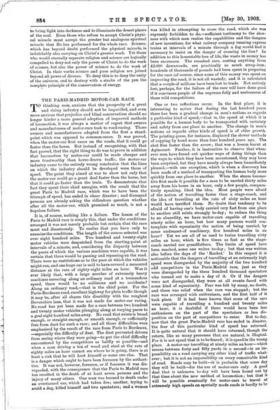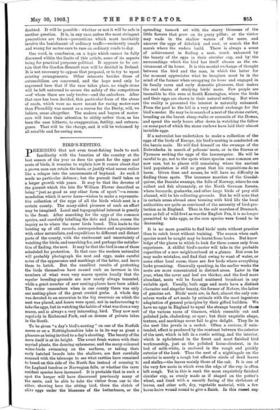THE PARIS-MADRID MOTOR-CAR RACE.
TO thinking men, anxious that the prosperity of a great and rising industry should not be imperilled, and even more anxious that prejudice and blind conservatism should no
longer binder a more general adoption of improved methods of locomotion, it was always a matter of regret that owners and manufacturers of motor-cars took to road-racing. Those owners and manufacturers adopted from the first a stand- point which was opposed to common-sense. It was proved, when the motor-car first came on the roads, that it could go faster than the horse. But instead of recognising, with that fact proved, that the right thing to do was to prove in addition that locomotion by motor-car could be made cheaper and more trustworthy than horse-drawn traffic, the motor-car industry came to the entirely wrong conclusion that the lines on which the industry should be developed were those of speed. The point they aimed at was to show not only that the motor-car could go a great deal faster than the horse, but that it could go faster than the train. To demonstiate that fact they spent their chief energies, with the result that the great Paris to Madrid race, which was to have been the triumph of speed, has ended in sheer disaster ; and dismayed persons are already asking the ridiculous question whether after all the motor-car, which promised so much, is not a hopeless failure.
, It is, of course, nothing like a failure. The lesson of the Paris to Madrid race is simply this, that under the conditions arranged it was not merely probable but certain that the race must end disastrously. To realise that you have • only to examine the conditions. The length of the course selected was over eight hundred miles. Two hundred and twenty-eight motor vehicles were despatched from the starting-point at intervals of a minute, and, considering the disparity between the paces of which the various machines were capable, it was certain that there would be passing and repassing on the road. There were no restrictions as to the pace at which the vehicles might run, and one huge car is said to have covered a measured distance at the rate of eighty-eight miles an hour. Was it ever likely that, with a large, number of extremely heavy machines careering along an ordinary road at a tremendous speed, there would be no collisions and no accidents ? Along an ordinary road,—that is the chief point. For the Paris-Bordeaux road, excellent highway for plain traffic though it may be, after all shares this disability with the roughest Devonshire lane, that it was not made for motor-car racing. No road has yet been made for a race between two hundred and twenty motor vehicles plunging along at varying paces to a goal eight hundred miles away. No road that exists is broad enough, or straight enough, or smooth enough, or sufficiently free from dust for such a race; and all those difficulties were emphasised by the result of the race from Paris to Bordeaux, —especially the difficulty of dust. The dust prevented drivers from seeing where they were going—to put the chief difficulty encountered by the competitors as baldly as possible—and when a man driving a ton of wood and steel at the rate of eighty miles an hour cannot see where be is going, there is at least a risk that be will hurt himself or some one else. That is a danger which ought to have been foreseen by the authori- ties. It was not, however, foreseen, or if foreseen it was dis- regarded, with the consequence that the Paris to Madrid race has resulted in the death of at least seven persons and the injury of many others. One man was burned to death under an overturned car, which had taken fire; another, trying to avoid a dog, killed himself and two spectators; and a woman was killed in attempting to cross the road, which she was expressly forbidden to do,—safficient testimony to the slow- ness with which men realise the capabilities and the dangers of new inventions, for what railway company running express trains at intervals of a minute through a fog would find it necessary to insist on the danger of crossing the line? In addition to this lamentable loss of life, the waste in money has been enormous. The smashed cars, costing anything from £2,000 downwards, are practically so much scrap-iron; hundreds of thousands of pounds had been spent in preparing for the race (of course, since some of this money was spent on improving the road, it is not all wasted); and it is calculated that a couple of millions have been lost to trade. Not entirely lost, perhaps, for the failure of the race will have done good if it convinces people of the supreme folly and uselessness of these wild competitions.
One or two reflections occur. In the first place, it is interesting to notice that during the last hundred years there has been a gradual change in men's notions as regards a particular kind of speed,—that is, the speed at which it is possible for a human body to be transported with certainty and safety from one place to another. The change in men's notions as regards other kinds of speed is of older growth. The printing-press, for instance, displaced the slower methods of copying by hand more than four hundred years ago. The shot flies faster than the arrow; that was a lesson learnt at Agincourt. Further, it is instructive to observe that when- ever men have found out 'quicker ways of doing things than the ways to which they have been accustomed, they may have been surprised, but they have nearly always been immediately pleased,—with one exception, which is when a discovery has been made of a method of transporting the human body more quickly from one place to another. When the steam locomo- tive first made it possible for a man to be carried thirty miles away from his home in an hour, only a few people, compara- tively speaking, liked the idea. Most people were afraid of the notion of travelling faster than a stage-coach, and the idea of travelling at the rate of sixty miles an hour would have terrified them. No doubt that tendency to be afraid of having one's body carried very fast from one place to another still exists strongly to-day; to reduce the thing to an absurdity, we have motor-cars capable of travelling ninety miles an hour, but how many persons would con- template with equanimity the notion of being carried, by some undreamt-of machinery, five hundred miles in an hour? Yet we are all of us used to trains travelling sixty miles an hour, which is five times as fast as the stage- coach carried our grandfathers. The limits of speed have been reached, some one writes to-day ; but that was written also before the days of the Rocket.' In this respect it is noticeable that the dangers of travelling at an extremely high speed were disregarded by the majority of the two hundred odd competitors in the Paris-Madrid race, just as they were disregarded by the three hundred thousand spectators who turned out to make a day of it. Or if the dangers were not disregarded, they were at all events faced with some kind of equanimity. Fear was felt by many, no doubt, and there was relief when the race was stopped ; but the race was arranged with enthusiasm, and the first half of it took place. If it had been known that some of the cars were capable of travelling a hundred and twenty miles an hour, it is doubtful if there would have been less enthusiasm on the part of the spectators or less dis- position on the part of competitors to enter. But to-day, now that the great Paris-Madrid race has ended in disaster, the fear of this particular kind of speed has returned. It is quite natural that it should have returned, though the return, like so many processes that are natural, is illogical. For it is not speed that is to be feared; it is speed in the wrong place. A motor-car travelling at ninety miles an hour—which means between forty and fifty yards in a second—is an im- possibility on a road carrying any other kind of traffic what- ever ; but it is not an impossibility on every conceivable kind of road. Roads may be built—it is probable that some day they will be built—for the use of motor-cars only. A good deal that is unknown to-day will have been found out by that time about the new method of locomotion ; but that it will be possible eventually for motor-cars to travel at extremely high speeds on specially made roads is hardly to bs doubted. It will be possible : whether or not it will be safe is another question. It is, in any case, unless the most stringent precautions are taken—precautions which must inevitably involve the banishment of ordinary traffic—eminently unsafe and wrong for motor-cars to race ou ordinary roads to-day.
One word, in conclusion, on a topic which cannot be fully discussed within the limits of this article, some of its aspects being for practical purposes political. It appears to be cer- tain that the Gordon-Bennett race will be decided in Ireland. It is not necessary to oppose that proposal, or to try to upset existing arrangements. Other interests besides those of automobilism are concerned, and the hope need only be expressed here that if the race takes place, no single stone will be left unturned to secure the safety of the competitors —of whom there are only twelve—and the onlookers. After that race has been decided, this particular form of the abuse of roads, which were no more meant for racing motor-cars than Piccadilly was meant as a course for the Derby, will, we believe, cease altogether. The makers and buyers of motor- cars will turn their attention to utility rather than, as has been the case hitherto, to exaggeration, futility, and extrava- gance. That will be the change, and it will be welcomed by all sensible and far-seeing men.







































 Previous page
Previous page